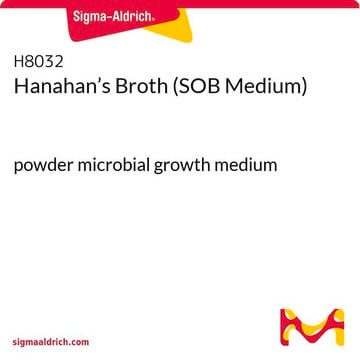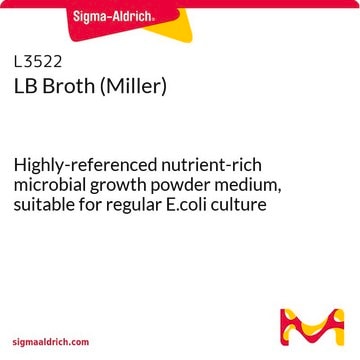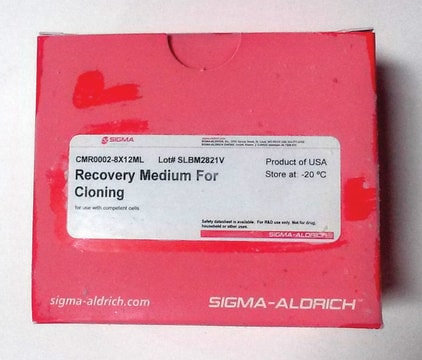Recommended Products
sterility
sterile (Filtered and Aseptic Handled)
Quality Level
form
powder
composition
glucose, 20 mM
magnesium chloride, 10 mM
magnesium sulfate, 10 mM
potassium chloride, 2.5 mM
sodium chloride, 10 mM
tryptone, 20 g/L
yeast extract, 5 g/L
technique(s)
microbiological culture: suitable
final pH
7.0±0.2 (25 °C)
application(s)
food and beverages
life science and biopharma
microbiology
storage temp.
2-8°C
suitability
nonselective for Escherichia coli
nonselective for coliforms
Application
SOC Broth is a sterile solution for the recovery of electroporated Escherichia coli cells.
Preparation Note
Immediately after electroporation add 1 ml sterile SOC Medium to the transformed cells and incubate for 30-60 minutes at 37°C with a moderate shaking .
Other Notes
Transformation of E. coli with plasmids
Footnote
We offer two media types: the superior granulated GranuCult® and the cost-efficient powdered NutriSelect® culture media, depending on your needs.
The designations basic, plus, or prime are added to indicate the quality control level, from basic quality control to standard QC plus to prime for full regulatory compliance.
The designations basic, plus, or prime are added to indicate the quality control level, from basic quality control to standard QC plus to prime for full regulatory compliance.
Legal Information
GRANUCULT is a registered trademark of Merck KGaA, Darmstadt, Germany
NutriSelect is a registered trademark of Merck KGaA, Darmstadt, Germany
Storage Class Code
10 - Combustible liquids
WGK
WGK 2
Flash Point(F)
Not applicable
Flash Point(C)
Not applicable
Personal Protective Equipment
dust mask type N95 (US), Eyeshields, Gloves
Choose from one of the most recent versions:
Already Own This Product?
Find documentation for the products that you have recently purchased in the Document Library.
Customers Also Viewed
F.M. Ausubel et al.
Current Protocols in Molecular Biology (1987)
Advanced Bacterial Genetics, Cold Spring Harbor (2007)
D Hanahan
Journal of molecular biology, 166(4), 557-580 (1983-06-05)
Factors that affect the probability of genetic transformation of Escherichia coli by plasmids have been evaluated. A set of conditions is described under which about one in every 400 plasmid molecules produces a transformed cell. These conditions include cell growth
Our team of scientists has experience in all areas of research including Life Science, Material Science, Chemical Synthesis, Chromatography, Analytical and many others.
Contact Technical Service












